British and European Union officials are locked in talks in Brussels over a compromise Brexit deal that could see the U.K. remain temporarily in the EU’s customs regime, people familiar with the negotiations said.
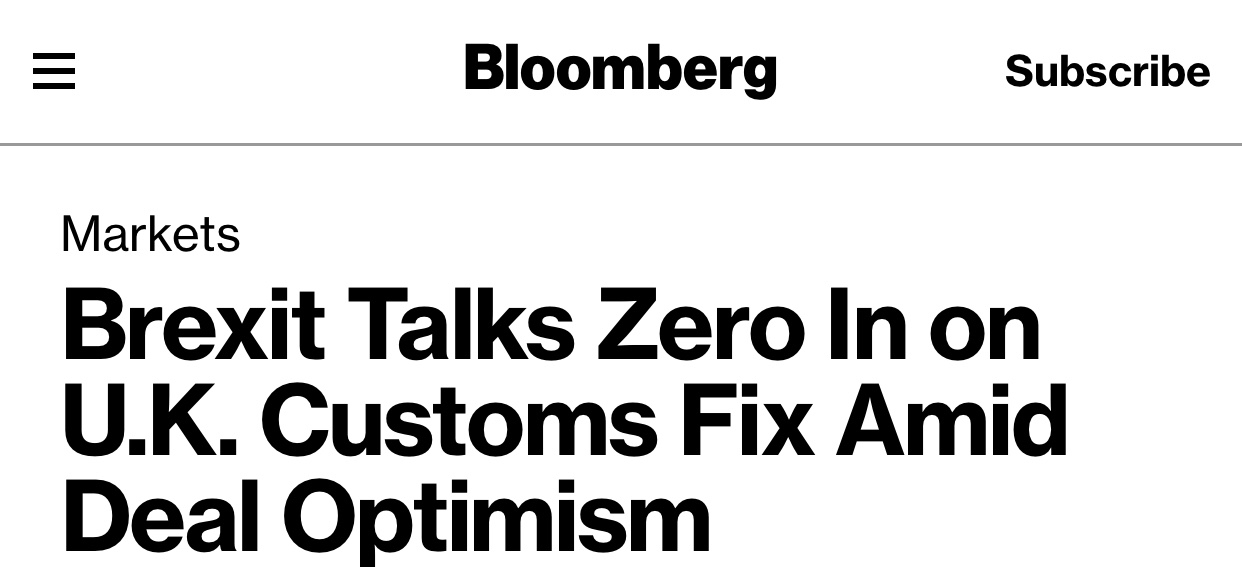
With just a week before a crucial summit of EU leaders that could determine the outcome of Brexit, officials from each side are wrangling over a potential solution to the biggest sticking point: how to keep the Irish border free from customs infrastructure. The U.K. is now unlikely to present any fresh proposals publicly and negotiators have not waited for one, the people said.
U.K. and EU diplomats said that intense negotiating over the next five days could result in a provisional agreement on the issue Monday. However, while there is positive momentum, many issues remain unresolved, they said.
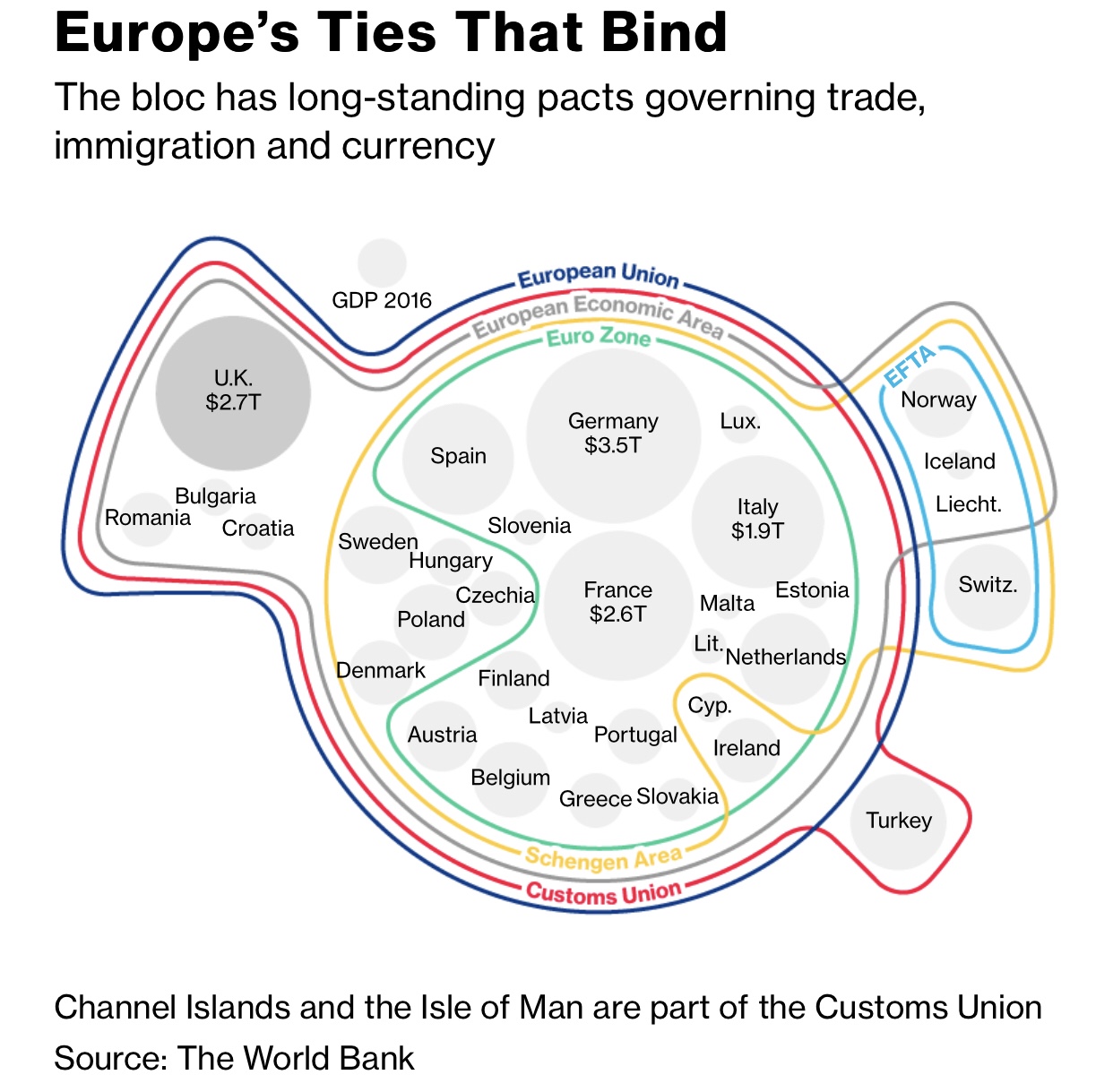
“Decisive progress must be made” before next week’s summit, European Commission spokesman Margaritis Schinas told reporters in Brussels on Wednesday. Chief EU negotiator Michel Barnier said a deal is “within reach” if talks advance in time for next week.
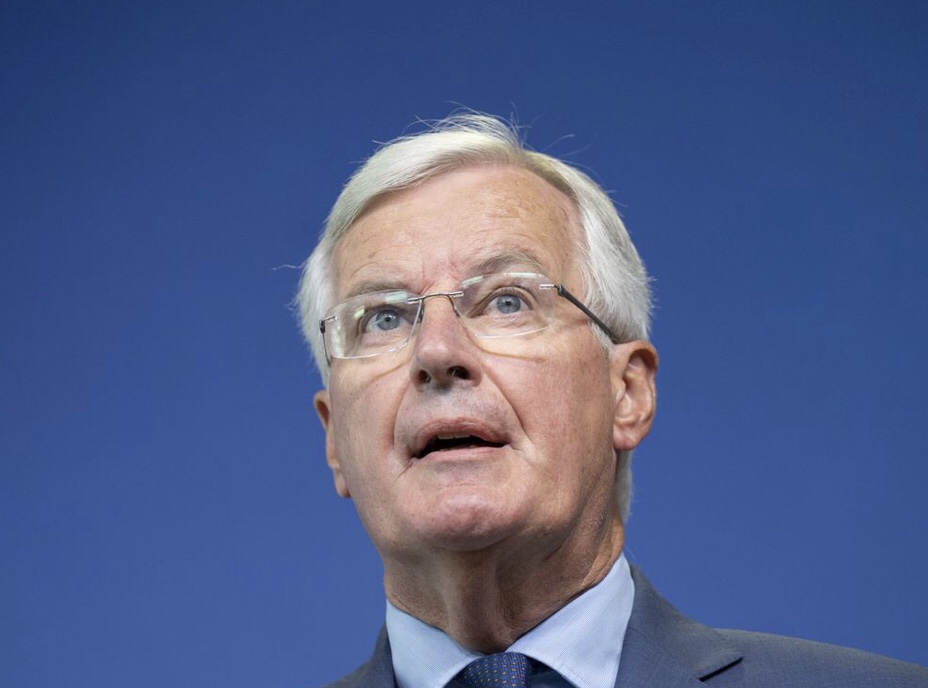
The negotiations are focusing on the so-called “backstop” for the Irish border – an insurance clause to make sure that whatever future trade deal is eventually drawn up between the two sides, no hard border will go up on the island of Ireland. It would only apply as a last resort in case an overarching trade deal doesn’t address the issue.
Under the U.K.’s latest plan, Theresa May’s government would back down on opposition to new regulatory checks on some items moving between the British mainland and Northern Ireland. In exchange, May’s team would need the EU to compromise and allow the whole of the U.K., not just Northern Ireland, to stay in the bloc’s customs regime.
That’s thrown up legal problems that the negotiators say must be resolved if there’s to be a deal. EU officials say only Northern Ireland-specific solutions can be part of the Brexit divorce agreement. U.K.-wide provisions must form part of the wider political declaration on the two side’s future relationship, but that’s not legally binding.
One solution floated by officials is to have only the regulatory checks element — relating to items such as food and livestock moving across the Irish Sea — to be set out in detail in the divorce agreement, officials said. There would be a legally binding reference to the customs arrangement, which would be described in more detail in the declaration on future ties.
The U.K. believes it can argue for different treatment of the two types of checks by saying that regulatory controls are a matter for the quasi-autonomous Northern Ireland assembly, while customs arrangements remain the prerogative of the central government in London.
In London on Tuesday, Brexit Secretary Dominic Raab indicated he still favored separating the customs regime from the regulatory checks. When pressed on his stance on the backstop during a question-and-answer session in Parliament, Raab said there mustn’t be a customs border between different parts of the U.K. — but that answer leaves the door open to a regulatory border between Northern Ireland and the British mainland.
The minister also underlined the U.K.’s demand that any backstop agreement to stay in the bloc’s customs rules must be strictly time-limited, something the EU is reluctant to accept. “We have been clear that the backstop would need to be a temporary and finite bridge to the future relationship,” Raab told lawmakers.
In addition to the Irish border issue, negotiators are also working on other outstanding issues in the divorce treaty, including the protection of geographical origin labels on products such as Champagne and Parma ham and a regime to settle disputes arising from the deal, as well as a draft of the declaration on the future relationship.
You can read the article here: Brexit Talks Zero In on U.K. Customs Fix Amid Deal Optimism
Source: Bloomberg
BBC News has written article about Trusted Trader concept and its potential role in a post-Brexit trade environment.
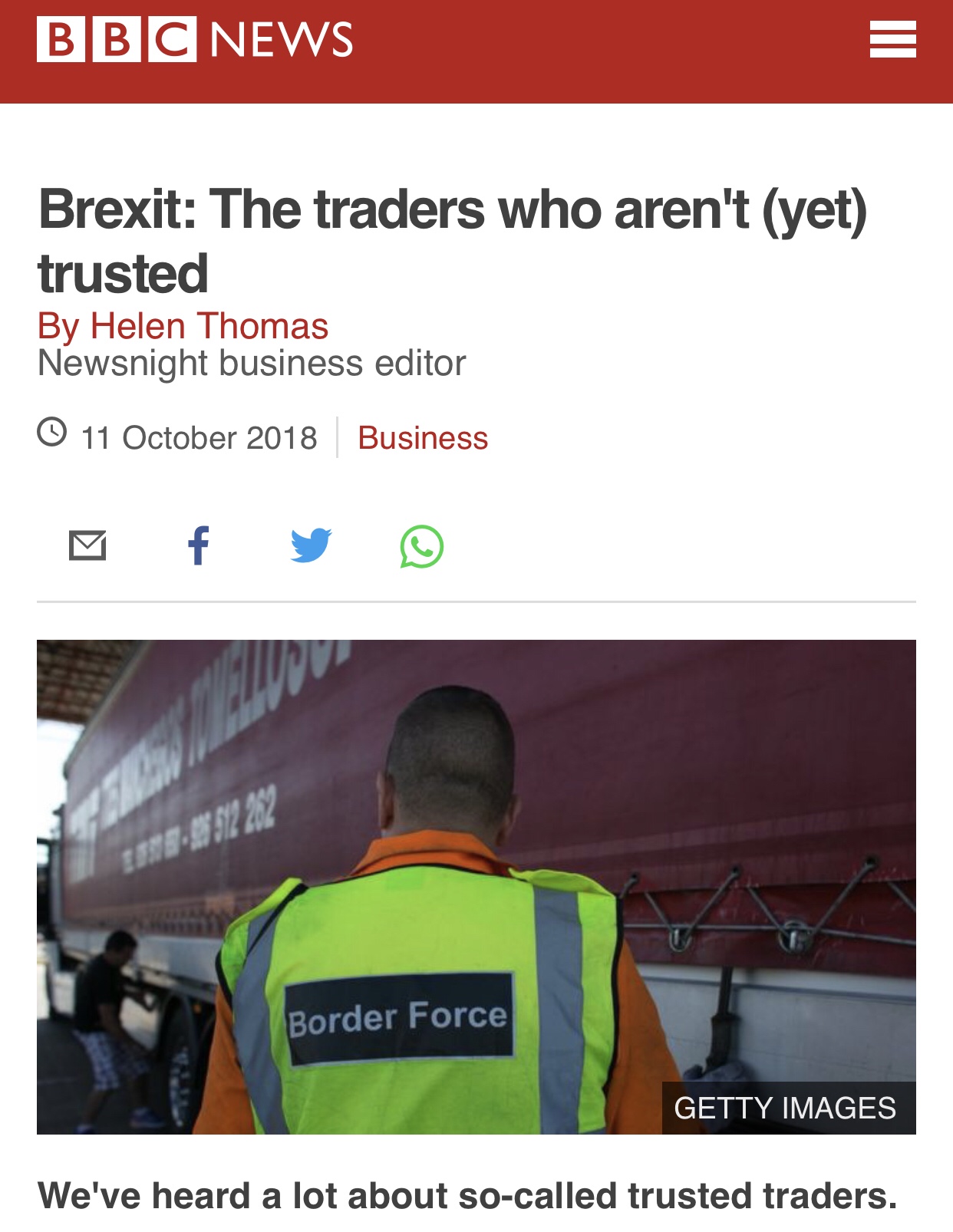
It is an interesting article and it does describe only one view on Trusted Trader and AEO, but it misses an important point. UK doesn’t have to use the same AEO programme as EU post-Brexit. In fact, UK shouldn’t. It should develop an own modern multitier Trusted Trader programme.
Having lead the work of inventing the Trusted Trader Concept, and the AEO Standard in the WCO Safe Framework, and being involved in the devlopment of the EU AEO and US C T-PAT models – and after that another plus 50 AEO and TTPs all around the world, I can say that this article only describes one view of TT and it also has several errors.
The EU AEO model is a legacy system that is 10 years old and it is only one of the approx. 80 programmes that are operational in the world for the moment. Modern Trusted Trader Programmes/AEO models are very different from the EU AEO, while still meeting the WCO Standard. The concept is in very fast development, bringing lower thresholds to get in, faster validation, considerbly more benefits, new ways of ensurimg compliance and low risk, more self-assessment, new KPIs and Performance Measurement models and multiagency and stakeholder reach embracing all border agencies/all supply chain stakeholders in single Government Trusted Trader concepts. This is already happening.
Nothing prevents UK from developing a new modern mulititier Trusted Trader programme (incl the present AEO).
Here is the link to the BBC article: https://www.bbc.com/news/business-45813901
Jacques Gounon, President of Getlink that operated the Eurotunnel, wrote an interesting article yesterday about the views of the company.
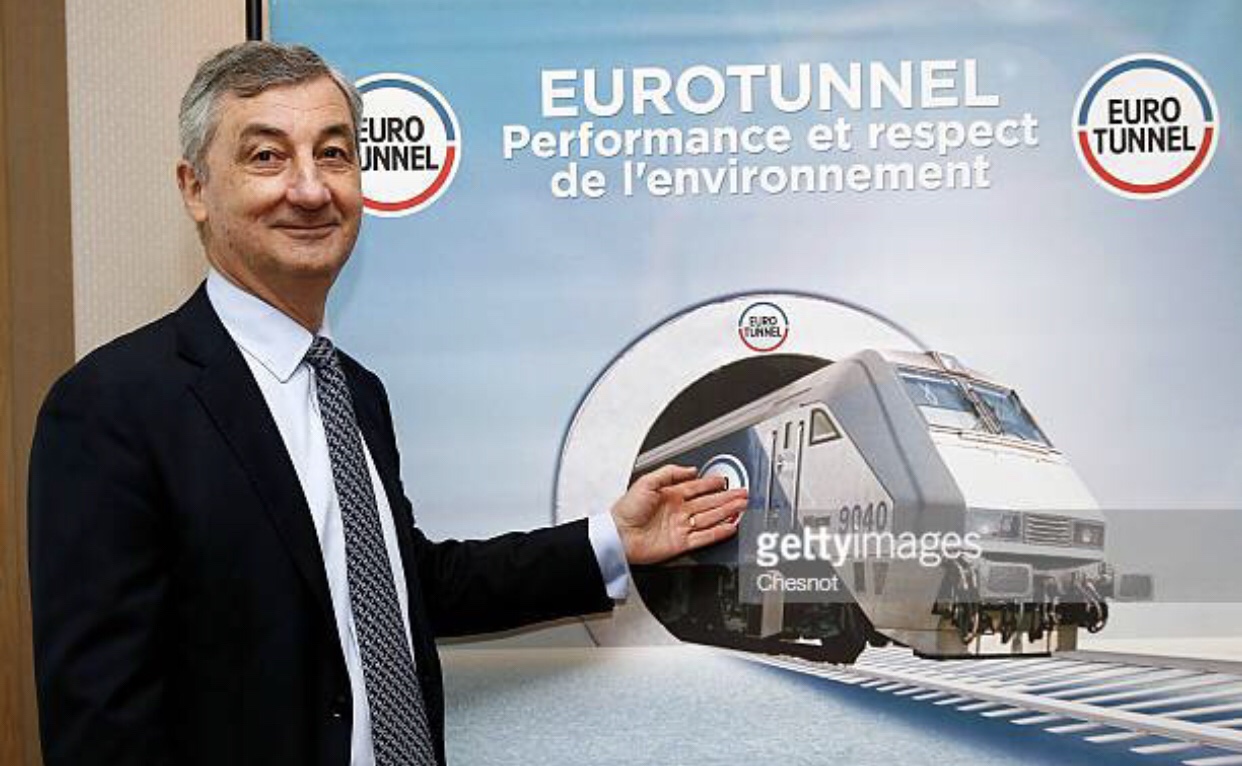
Negotiations between the European Union and the United Kingdom agitated commentators on both sides of the Channel.
For Eurotunnel, Brexit will be a matter of technologies and people: it will be an opportunity for us to gain competitiveness and efficiency for our customers. We were the first to let the various political actors know how important this vital link is and the challenge of a smooth border for jobs and economies – not just on the British side.
We set ourselves in motion to integrate the additional controls that will apply to the customs, veterinary and police authorities already present on our terminals. And that these controls are integrated in the customer journey in a “smart border”.
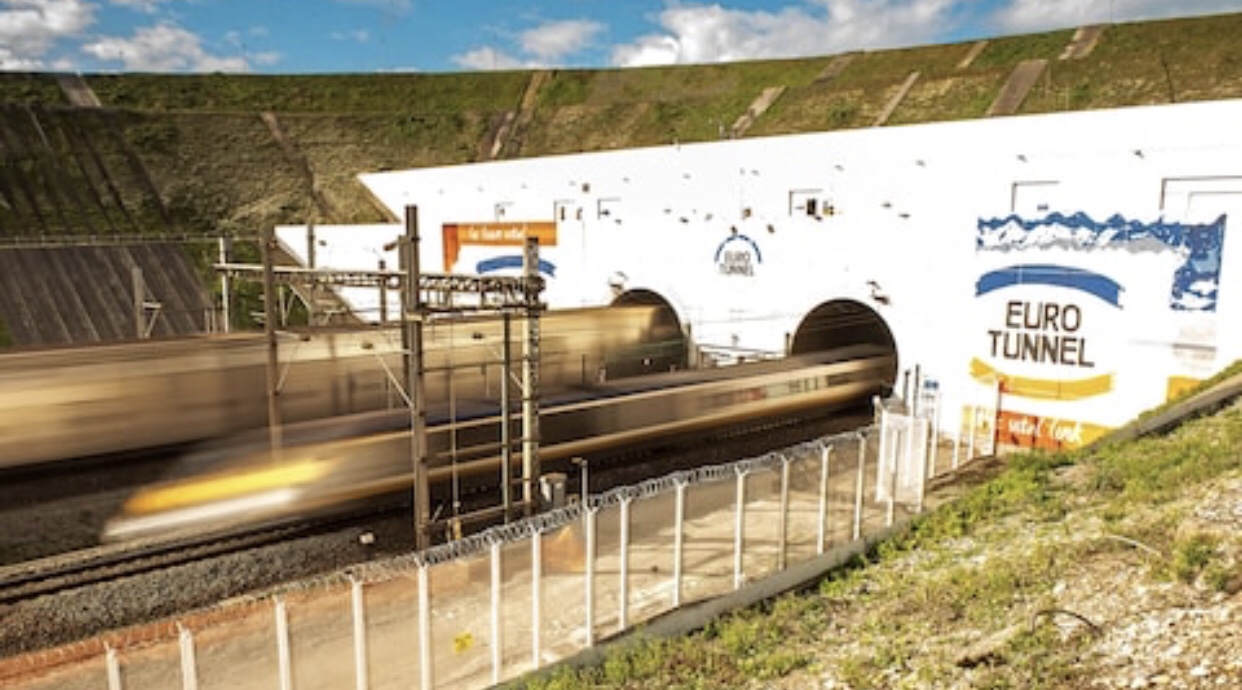
Border control remains the sole responsibility of States. Even if the negotiations in Brussels are crucial, these provisions will be covered by binational agreements. Whether we are in a Schengen / non Schengen configuration as currently, or tomorrow Schengen / third country (UK), the post-Brexit situation is not new for the public services concerned.
In fact, the French government is preparing to put in place, before 29 March 2019, the legal tool enabling it to take the measures that would be necessary in the event of a withdrawal agreement. The enabling bill presented on October 3 by Jean-Yves Le Drian and Nathalie Loiseau allows France to prepare effectively for the consequences of Brexit. In the same vein, Gerald Darmanin announced the creation of 700 additional customs posts to cope with any additional activity at Eurotunnel, ports and airports.
We have an accurate and realistic view of how we will start transformations as soon as the political vision is clarified. We have not waited to increase our hosting capacity and our customer service for two years. We are preparing for all contingencies to ensure continuity of service.

Eurotunnel is preparing with calm, method and determination to the new elements that will intervene in the management of the border between March 2019 and the year 2021 taking into account different scenarios.
Source: LinkeIn/Machine translation






You must be logged in to post a comment.